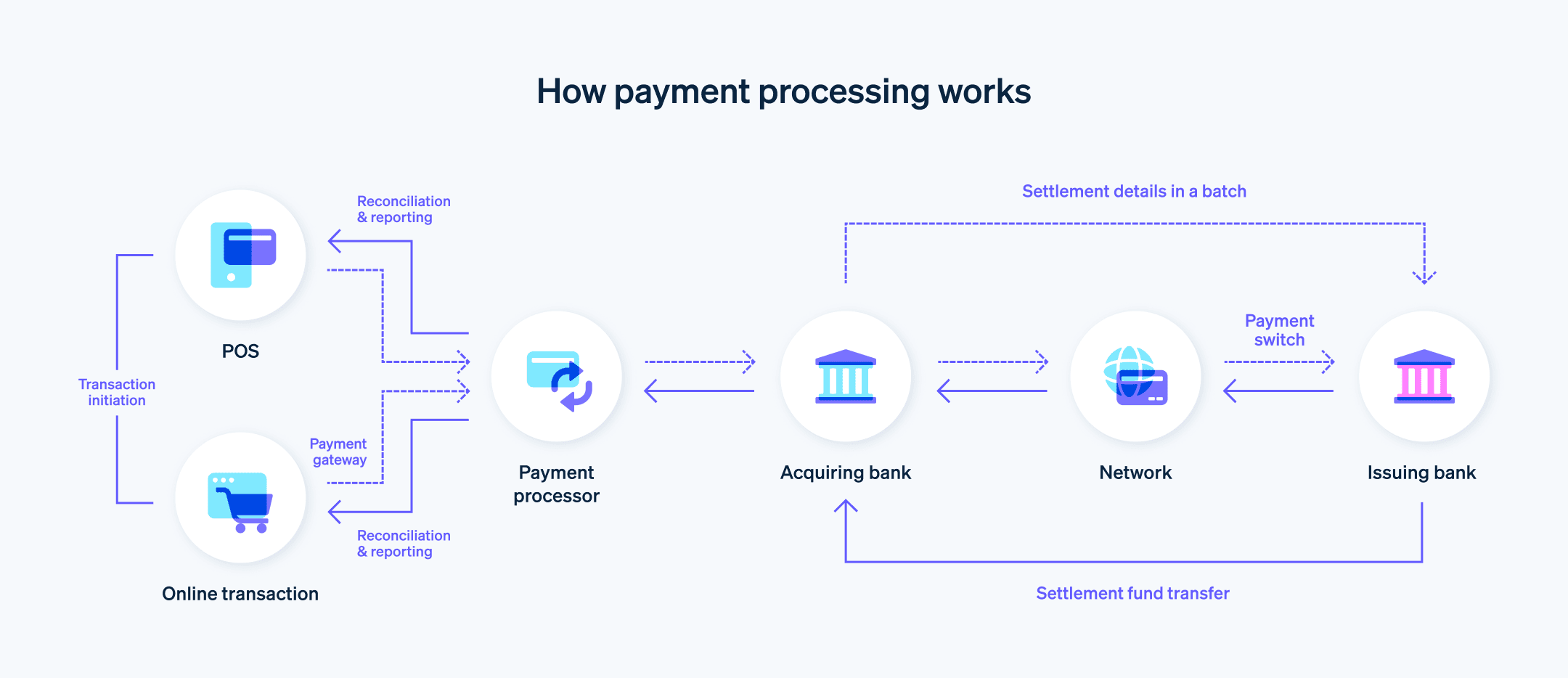电子商务和数字支付的快速增长,正在彻底改变企业与客户之间的互动方式。据估计,2023 年数字支付交易额将达到近 9.5 万亿美元。此外,约 70% 的消费者偏好数字支付选项,这使得企业不仅需要支持数字支付方式以满足客户需求,还必须确保其支付解决方案高效、可靠且安全。
选择合适的支付服务商是一个关键决策,可能对企业的整体表现、客户体验和潜在增长产生重大影响。理想的支付服务商应能简化支付流程,提供强大的安全保障,支持多种支付方式和货币,并通过提供有价值的分析支持企业决策。
本指南将探讨企业在选择支付服务商时需要考虑的关键因素。
目录
- 什么是支付服务商?
- 支付服务商的作用是什么?
- 支付服务商 vs. 商家账户提供商
- 使用支付服务商的好处
- 如何选择支付服务商
什么是支付服务商?
支付服务商 (PSP) 是促进不同方(如客户、商家和银行)之间电子支付交易的公司。它们使商家能够通过单一平台或集成接受多种支付方式,包括信用卡、借记卡、数字钱包和银行转账。支付服务商提供必要的基础设施、安全措施和符合法规的保障,以便商家能够安全高效地处理支付。
支付服务商的作用是什么?
支付服务商在促进商家和客户之间的电子支付交易中起着重要作用。它们提供一系列服务,以确保安全、高效和集成的支付处理。
以下是支付服务商提供的服务概述:
支付网关
支付服务商提供一个安全的在线门户,称为支付网关,它将商家的网站或应用与支付处理系统连接。这使得客户、商家和银行之间的支付信息能够安全传输。支付处理
支付服务商负责授权、清算和结算交易的过程。它们与客户的银行或发卡行沟通,以验证交易详情,检查是否有足够资金,并获取授权。一旦交易被授权,支付服务商就会促进资金在客户账户和商家账户之间的转移。我们将在下面进一步解释支付服务商与商家账户提供商之间的区别。欺诈检测与预防
支付服务商使用先进的工具和系统来识别和防止欺诈交易。它们监控交易模式,并使用机器学习算法来检测可疑活动,从而保护商家免受撤单和其他潜在的欺诈风险。合规与安全
支付服务商负责确保其系统和流程符合必要的行业标准和法规,如支付卡行业数据安全标准 (PCI DSS)。这确保了敏感支付数据的存储、处理和传输的安全性,从而降低了数据泄露和欺诈的风险。货币兑换
对于跨国经营的商家,支付服务商提供货币兑换服务,使商家能够接受多种货币的支付,并以其首选货币结算交易。报告与分析
支付服务商提供详细的报告和分析工具,向商家提供有关交易、客户行为和整体业务表现的重要洞察。这有助于商家做出数据驱动的决策,并优化其支付流程。客户支持
支付服务商通常会向商家提供客户支持,解决在支付过程中可能出现的任何问题或疑问。
支付服务商使商家能够接受多种支付方式,促进全球商业,并确保电子支付交易的安全性和效率。

支付服务商 vs. 商家账户提供商
支付服务商和商家账户提供商都参与了让商家能够进行电子支付交易的工作。然而,它们的目的不同,所提供的服务也有区别。以下是它们的对比:
支付服务商
- 支付服务商是提供一系列服务以促进客户、商家和银行之间电子支付交易的公司。
- 支付服务商提供支付网关,这是一个将商家网站或应用与其支付处理系统连接的安全在线门户。
- 支付服务商允许商家通过单一平台或集成接受多种支付方式。
- 支付服务商负责处理支付、欺诈检测与预防、货币转换、报告、分析和客户支持。
- 支付服务商通常采用共享或汇总商家账户,这意味着多个商家共享一个账户进行支付处理。这使商家能够更容易、更快速地开始接受支付。例如,Stripe 为其支付服务客户提供商家账户功能,消除了商家需要开设自己的商家账户的必要。
商家账户提供商
- 商家账户提供商通常是银行或金融机构,它们为商家提供专用的商家账户。商家账户是一个专门的账户,允许商家接受和处理电子支付,如信用卡和借记卡交易。
- 除了提供商家账户外,商家账户提供商还可能提供支付网关,但这并不总是如此。
- 为了获得商家账户,商家必须经过更严格的承保过程,包括评估商家的财务稳定性、信用历史和潜在风险。
- 商家账户提供商通常提供更定制化的定价,尤其是对于高交易量的商家,交易费用可能比支付服务商低。
- 商家账户提供商可能更适合大型企业或有特定需求且支付服务商无法满足的企业。
支付服务商和商家账户提供商之间的主要区别是它们为支付处理提供的账户类型。支付服务商提供的是一个更简化的一站式解决方案,使用汇总商家账户,而商家账户提供商提供的是一个专门的商家账户,仅服务于单一商家。此外,支付服务商通常不需要商家账户提供商所要求的那种申请和承保过程。
使用支付服务商的好处
使用支付服务商为商家带来多种好处,尤其是对于那些在线运营或进行电子支付交易的商家。以下是使用支付服务商的一些好处:
设置和集成简单
支付服务商通常提供易于使用的 API 和集成工具,使商家能够以最少的设置时间在其网站或应用上开始接受支付。这样可以节省时间和精力,消除了需要开设专用商家账户并集成独立支付网关的必要。提供多种支付方式
支付服务商使商家能够通过单一平台接受多种支付方式,如信用卡、借记卡、数字钱包和银行转账。这简化了支付处理,创造了方便快捷的客户体验,并帮助商家通过提供客户在不同市场偏好的支付方式保持竞争力。支持全球拓展
支付服务商通过支持多种货币和在不同国家/地区受欢迎的支付方式促进国际交易。这使商家能够拓展市场,吸引来自全球的客户,并进入新市场。更容易保证安全和合规性
支付服务商负责确保其系统和流程符合必要的行业标准和法规,如PCI DSS。这为处理交易提供了安全环境,并减轻了商家合规方面的负担。强大的欺诈检测与预防
支付服务商使用先进的工具和系统来识别和防止欺诈交易。通过监控交易模式并使用机器学习算法,支付服务商能够检测可疑活动,并保护商家免受撤单和其他与欺诈相关的风险。报告与分析
支付服务商通常提供详细的报告和分析工具,帮助商家了解其交易、客户行为和整体业务表现。这有助于商家做出明智的决策并优化支付流程。除了支付服务商本身提供的报告和分析外,大多数支付服务商还可以轻松集成第三方分析和报告工具,以提供更全面且可操作的支付数据。简化的定价和计费
支付服务商通常具有透明且直接的定价结构,使商家更容易理解和管理其支付处理费用。一些支付服务商还提供合并账单服务,简化了商家的财务管理。支持可扩展性
支付服务商能够满足不同规模商家的需求,并提供可以随着业务增长轻松扩展的功能。这意味着商家可以在扩展时继续使用同一个支付服务商,而无需更换供应商或重新建立支付处理安排。客户支持出色
支付服务商通常提供专门的客户支持,帮助商家解决支付过程中可能出现的任何问题。对于那些可能没有足够资源自行管理支付处理问题的小型商家来说,这尤其有价值。
当然,并非所有支付服务商都相同,一些支付服务商会提供其他支付服务商没有的功能和服务。对于商家来说,挑战是双重的:
- 明确了解您的支付服务需求、期望和要求。
- 缩小所有可能的支付服务商范围,选择最能满足您短期和长期需求的提供商。
如何选择支付服务商
选择合适的支付服务商可以帮助商家为客户提供流畅且安全的支付体验,同时优化运营效率和促进收入增长。
以下是评估选择时需要考虑的一些因素:
支持的支付方式
确保支付服务商支持目标客户常用的支付方式,如信用卡、借记卡、数字钱包和先买后付 (BNPL)。提供多种支付选项可以提高客户满意度,并增加客户完成购买的可能性。货币支持
如果您的业务在国际范围内运营或计划扩展到全球市场,选择支持多种货币并提供货币转换服务的支付服务商。例如,Stripe 支持超过 135 种货币,这使其成为适合国际运营或寻求全球扩展的商家的选择。集成与兼容性
评估支付服务商与您现有的网站、电商平台或应用的集成难易程度。例如,Stripe 提供易于使用的 API、插件和 SDK,简化了与现有网站、电商平台或应用的集成过程。Stripe 与各种技术堆栈兼容,确保商家能够快速开始接受支付。定价与费用
比较不同支付服务商的费用和定价结构。有些支付服务商可能按每笔交易收取固定费用,而有些可能按交易金额收取百分比费用。此外,还需考虑其他费用,如设置费、月费、撤单费和货币兑换费。Stripe 提供透明且直接的定价结构,包括按交易收取的百分比费用和固定费用。安全性与合规性
选择遵循行业标准安全实践并符合如 PCI DSS 等法规的支付服务商。这确保了敏感支付数据的存储、处理和传输的安全性,从而降低了数据泄露和欺诈的风险。例如,Stripe 是 PCI 服务提供商一级认证,这是支付行业中最严格的认证级别。欺诈检测与预防
选择提供强大欺诈检测和预防工具的支付服务商。这可以帮助维护商家的声誉并减少财务损失。Stripe 的先进欺诈检测和预防工具,包括基于机器学习的解决方案 Radar,帮助保护商家免受欺诈交易和撤单的风险。报告与分析
选择提供详细报告和分析工具的支付服务商,这些工具可以提供有关交易、客户行为和整体业务表现的重要见解。这些见解可以帮助商家做出明智的决策,并优化支付流程。客户支持
评估支付服务商的客户支持服务质量。寻找响应迅速且知识丰富的客户支持团队,以解决问题并确保客户的支付体验顺利。在这里了解更多关于 Stripe 的聊天、电子邮件和电话支持选项的信息。可扩展性
考虑支付服务商是否能够适应您业务的增长和变化需求。随着业务的发展,您可能需要额外的功能、支付方式或更高的交易量。选择一个可以随着业务发展并适应变化需求的支付服务商。Stripe 服务于各类商家,并且可以随着业务发展轻松扩展。它的功能和能力可以满足商家不断变化的需求,是一个可靠的长期支付服务商解决方案。声誉与评价
研究支付服务商在行业中的声誉,并阅读其他使用该服务的商家的评价。这可以帮助您更好地了解支付服务商的可靠性、性能和客户支持水平。
选择合适的支付服务商可以显著影响您业务的成功。通过仔细比较不同的支付服务商,您可以找到最适合您业务需求的提供商,确保为客户提供安全且顺畅的支付体验。
本文中的内容仅供一般信息和教育目的,不应被解释为法律或税务建议。Stripe 不保证或担保文章中信息的准确性、完整性、充分性或时效性。您应该寻求在您的司法管辖区获得执业许可的合格律师或会计师的建议,以就您的特定情况提供建议。